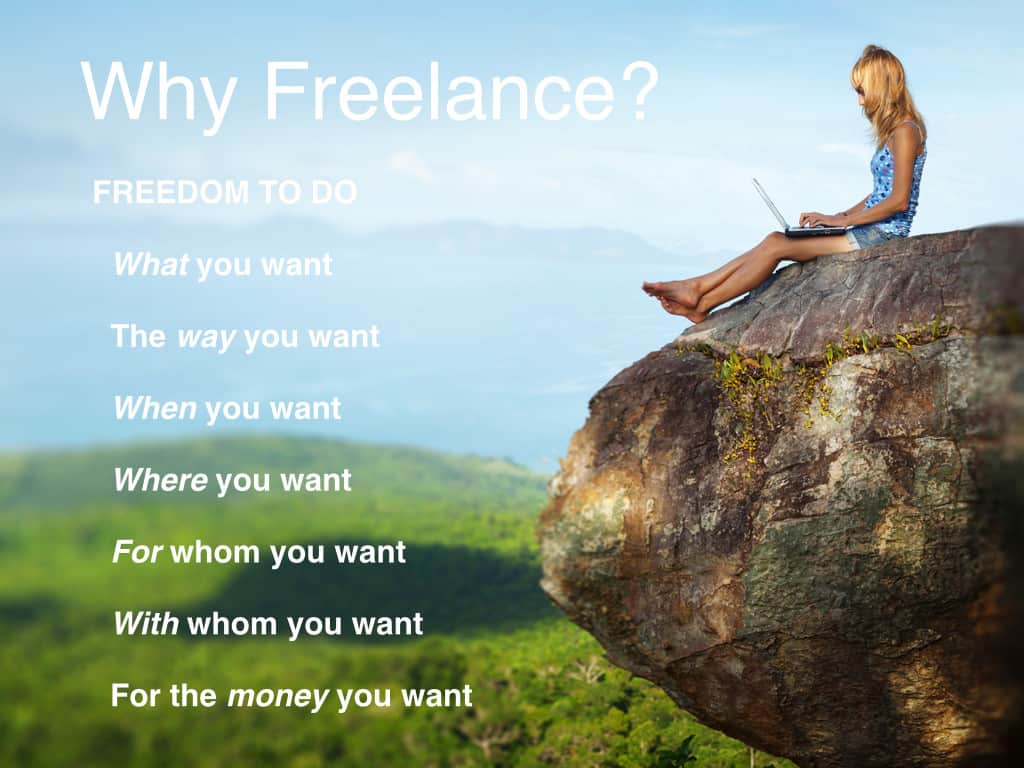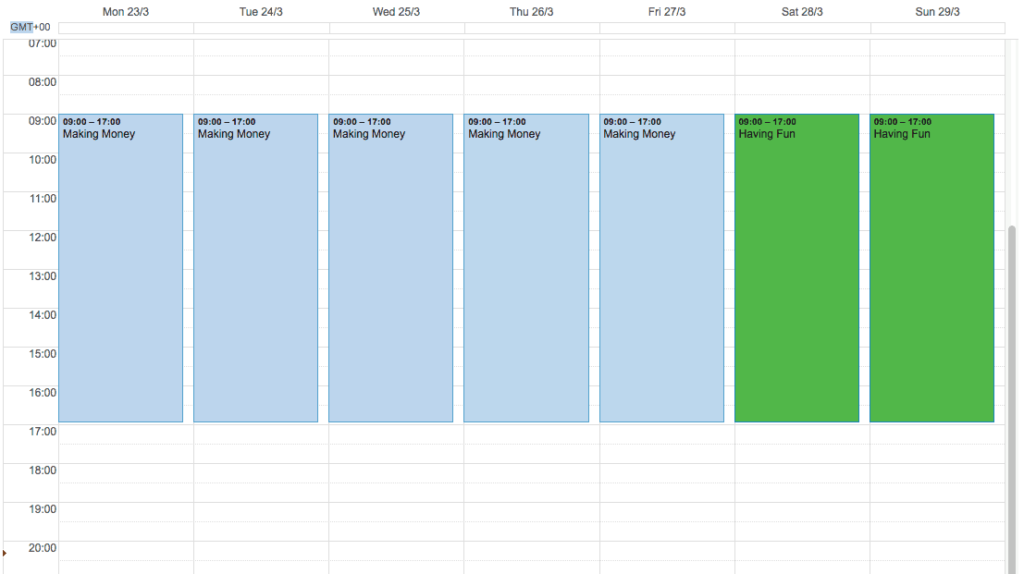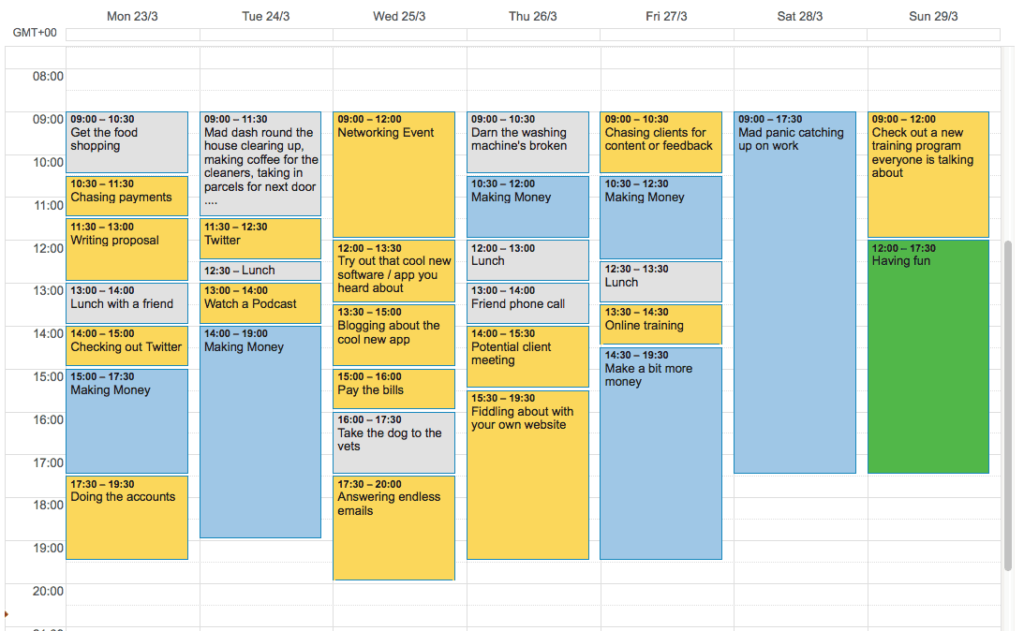I presented this talk “Going Freelance” at WordCamp London 2015. Below are my notes or you can watch the video on WordPress.tv.
Summary
Jo Waltham isn’t a lawyer nor an accountant but someone who has been successfully freelancing for the last 5 years. We’ll look at the options of being a sole trader or limited company, being VAT registered or not. We’ll assess just how much time you will really be doing billable work and what time you’ll need to spend on sales, marketing and admin. Will cover how to get to grips with your costs and how to calculate your minimum hourly rate.
Introduction
Hi, I’m Jo Waltham and I’ve been freelancing for 5 years. So tell me, who here is already a freelancer, or working for themselves, or running their own business?
There are two reasons why people freelance or work for themselves. The first is out of necessity, say they are between jobs and the second is because they want their FREEDOM!

If this appeals to you listen on….

A little about me and why I started freelancing. My father has run his own business all my life and as I grew up I wanted to do the same. But after University I got a job in IT Support and spent too much time crawling under desks and kind of forgot about it. I got married and had a couple of kids and thought no more about it.
Then my mother got cancer and for the last four months of her life, I spent 2 days a week, away from my kids, husband and work, to look after her. She told me that time passes so quickly and if there’s something you want to do then you had better just get on with it!
When my mother died I had a complete knee jerk reaction and quit my job and decided I would start my business, an online shop selling baby equipment. After lots of procrastinating about the whole sole trader versus limited company and VAT registration or not, I started as a non VAT registered sole trader and dived straight in.
Now here’s my first tip…. Don’t decide to suddenly start a business when you are exhausted and emotionally drained! It was not pretty and my first business didn’t do so well.
But you live and learn, and reassess. Whilst running Baby Loves Shopping I discovered a community of women who had small businesses working from home who needed help with their online services. So I started up a web support services company called Magenta Sky Solutions.
This business was going well as I had discovered a niche that needed the help I could offer. I was, at last, making money! I found I was doing more WordPress work than anything else and having first learnt to code in the 90’s I started digging around in the PHP / CSS / HTML code so I could customize and develop themes and plugins myself.
Then two things really happened at once. First, another company used the name Magenta Sky Solutions as their limited company name. Whilst I could have continued trading using the name because we worked in different industries but it was causing confusion as I had the online presence and she didn’t and I was getting her telephone calls and emails.
The other thing that happened was I started a couple of projects with bigger businesses who basically said that they would be happier working with me if I was running as a limited company. So I rebranded to Callia Web to reflect that most of my work was building websites and set up as a limited company. I’m now in my third year of trading as Callia Web and just started growing the team and the future looks great.
So what’s stopping you?
I find the questions fall into 4 categories:
- Money
- Not sure how to start
- Getting clients
- Lifestyle
Let’s start with money
I’ve got the mortgage to pay and/or kids to feed

If you have big financial commitments then look at alternative ways to get started. You don’t have to give up your job completely. Maybe get a few small projects that you can work on over the weekend and evenings. It’s tough and tiring. But if you see you can get work in then that might encourage you to take the next step of maybe requesting to go part-time in your job, giving you more time to start building your business until eventually, you feel ready to take the final leap.
One thing to note, if you are planning on getting a mortgage or remortgaging in the next 2 years then don’t become self-employed right now. Most mortgage companies require 3 years of accounts before they will consider your income when assessing the mortgage affordability for you.
If you don’t have such big commitments but still need to eat and pay the rent, then look at saving hard and fast. Build up a nest egg of say 3 or 6 months of living money. Start freelancing in the evenings and weekends and put that money in the pot. It’ll also save you money as you’ll be too busy to go out anyway! Once you’ve got enough funds then you can go for it. Or if you still are not sure you can also ask your current employer if you can go part-time.
How much will I realistically earn?

If you think you’ll be earning money 7.5 hours a day for 5 days a week then you are in for a bit of a surprise!
You have to allow for administration time, sales, marketing, networking, learning. All of this can take 25 – 40% of your time.
If you’re like me some people may think that because you work from home you’re available to take the dog to the vets, have a coffee with the neighbour, or have an hour-long chat on the phone with a family member….
So you will require some dedication to not get too distracted …

I really recommend having a dedicated working space in your home so you set clear boundaries for yourself too.
I suggest you work out (and keep reassessing when you have some real data) what your minimum hourly rate is. This isn’t a figure you are going to share with your clients but for your own use so you can keep an eye on whether you are achieving this figure or not.
First, you need to add up your fixed costs:
- Insurance
- Accountancy and/or book keeping fees
- Office fees if you’re not working from home
- Training materials
- Computer equipment and office furniture
- Software
- Broadband and telephone
- Marketing
Next work out what you need to earn to live your life as you wish. Work out how much tax you’ll need to pay on that income. Add those together to get your gross income.
Be realistic about the number of hours you’ll work a day and how many days a year you’ll work (remember to factor in holidays, bank holidays, possible sick days), and assume you’ll spend no more than 75% of your available hours on billable work.
Finally, take your gross income plus your fixed costs and divide it by the number of billable hours.
Let’s look at some sample numbers:
Hours
- 4 weeks holiday + 2 weeks of bank holidays + 1 week off sick = 7 weeks
- Therefore available to work 45 weeks a year, at 5 days a week for 8 hours a day = 1800 hours
- On average 75% of your time is billable= 1,350 billable hours
Costs
- Insurance – £200
- Accountancy Fees – £300
- Annual Training – £600
- Computer equipment – £800 (that’s one iMac over 2 years)
- Software – £800
- Usage of home services (electricity, broadband) – £300
- Fixed costs = £3,000
Income
- Desired Income = £30,000
- Tax, NI and optional Pension to pay on that £7,500
- Total Turnover required = 3,000 + 30,000 + 7,500 = £40,500
Minimum hourly rate
- £40,500 / 1,350 hours = £30ph
Do this with your own numbers. Is this a scary number? Do you think you are worth it?
Another tip, is however you charge your client, whether hourly, fixed project or value-based pricing, at the end of the project note down how much you charged and what time you spent so you can work out your effective hourly rate and keep an eye that this is above your minimum hourly rate!
 Budgeting for Tax
Budgeting for Tax
One piece of excellent advice I had when I started, was every time you take money out of your business, put 20% of it into a savings account. This way you will have more than enough to pay that tax man when the time comes. And if you’ve got extra in the savings account you can either give yourself a little bonus, or keep it in the business for those difficult cashflow moments.
Logistics of setting up a business
Limited Company or Sole Trader?
When you start you have essentially two choices, unless you’re going into a partnership. That is to be a “sole trader” or a “limited company”
As a sole trader, you are the business, the business is you. All you need to get started is to tell HMRC that you are now a sole trader and at the end of the financial year submit your self-assessment tax return.
If you decide to operate with a business name you just need to ensure that the name you choose is not being used by a limited company by looking on Company Check. Also check it is not a registered trademark.
As a sole trader, it is difficult to protect your business name. One option is to register a “dormant” limited company. You have to file a zero return every year but an accountant will be able to advise you on this.
I was mightily annoyed when my trading name got registered as a limited company! Especially as I had considered registering it as a dormant limited company but hadn’t actually got round to doing it.
As a sole trader, you have full control over the business, any profit you make is yours and there is less red tape for you to deal with so accountants tend to charge less too.
But as a sole trader the law sees you and your business as one. So if your business goes into debt then your personal assets are at risk. If someone sues your business they are suing you.
If that sounds too scary then consider registering a limited company. A limited company is a separate legal entity to you. Your liability is limited to the investment you made in the business. The limited liability is the main advantage over being a sole trader but there are others, such as some tax advantages. Due to the way you take money out of the limited company as a mixture of salary and dividends you can pay less tax than if you were a sole trader once your income starts hitting the £25,000 mark. In addition as a limited company, you can claim a wider range of expenses than self-employed.
It is generally perceived that a limited company appears more “established” but do be aware your accounts do get published and are available for anyone to have a look!
To register a limited company you need to find a unique name and then essentially fill out a form and pay £13. Your accountant may do this for you for a fee or there are various other companies who offer services to help you register.
As a limited company, your registered business address is public knowledge so you may want to make it an address other than your home address. Mine is my accountant’s address and it is part of his service to me. There are other companies that offer virtual registered business addresses. This address should be on your website and all communications with clients and suppliers along with your registered business number.
You also need a business bank account if you are a limited company, you cannot use a personal bank account for a limited company.
If you are not sure what legal structure will suit you best, and you’re not terrified of the unlimited liability that being a sole trader brings, then I suggest you start as a sole trader and then move to a limited company when you have good reason too. You can even sell your sole trader company to the new limited company and get a bit of tax relief on that value!
Bank accounts and Invoicing
It is best to open a separate account for all your business transactions. If you want to accept payments to your business name, rather than your name, then you’ll need a business account. Otherwise, a separate personal account will suffice in the beginning if you are a sole trader.
Next, you need to keep a record of all your expenses, so you can offset these costs against your income to reduce your tax bill. Also, you need to record all incoming money too.
A simple spreadsheet will suffice for you but there are some great online bookkeeping and accountancy tools such as:
- Xero
- Freeagent
- Freshbooks
- Kashflow
- Crunch
One advantage of these is they help you create invoices but you can always use a Word template for your invoices. If you want to get paid in a timely manner you’ll want to be clear about your payment terms on your invoice and I recommend actually putting a due date on your invoice so your client is in no doubt.
Do I need an accountant?
Whether you need an accountant or not, in the beginning, will depend on how much you like dealing with HMRC, and filling out forms and have an understanding of what is a tax allowance expense and what isn’t.
Whilst I thought I could probably figure that all out I decided to save the time and to be reassured that my accounts were all in order and hired an accountant. To give you an idea of the cost I asked my accountant what he charges:
- £30pm – Sole trader (keeping accounts in a spreadsheet)
- £54pm – VAT registered sole trader (including Xero)
- £102pm – Limited company with payroll (including Xero)
- £150pm – Vat registered limited company with payroll (including Xero)
(Prices include VAT)
Do I need to register for VAT?
The quick answer is no unless you start turning over £81,000.
But when you are VAT registered you can claim back the VAT you have spent. So if your clients are themselves VAT registered they won’t mind paying the VAT on your invoice because they can also claim it back.
However, if most of your clients are not VAT registered then it is probably not worth it. Your clients will have to pay the extra 20% and there is an administrative burden to being VAT registered and the time spent on this will probably outweigh the benefit.
Do I need to get a lawyer to write a contract for my clients?
There are a number of contract templates available. The best thing is to have a look at them, read them all through, revise and then get them checked.
That said a contract is a great way to detail what the expectations of both parties are, and the Contract Killer from Stuff and Nonsense is great for this.
Heather Burns, speaking earlier today, also has a great reference for what goes into a good website contract.
Getting Clients
How do I find clients?

This will depend a bit on what clients you want to attract. You want to find your niche. When I started I found a lot of women felt they couldn’t go to a web agency because they didn’t have the budget for that. They also felt they couldn’t approach freelance web developers because they were worried about the discussion getting very technical and that they wouldn’t understand. I realized therefore that my niche was to serve these women. It worked really well and most of my work in the first few years came from word of mouth referrals.
But for you, I’d suggest simply let people know that you are available. If you’re happy to sub-contract for other agencies then call them up and let them know. If there’s a job board here then add your details.
In our GenesisWP community, I know a number of people who are looking to outsource parts of projects.
It’s a great way to get some regular work, whilst you figure out how to attract the clients you want.
Winning that first client is key. Building up a portfolio is so important before you will be able to attract clients through your website.
Networking – getting out there and saying “Hi I’m a web developer/designer/writer”. I’ve picked up clients whilst on holiday, at a Scouts committee social, presenting at a Food bloggers conference, and networking events.
Have a look at your local Chamber of Commerce, BNI, 4N, Business Biscotti. Also, look around for some local networking events.
Now you’ve got work coming in, what do you enjoy most? What kind of client excites you? This will help you identify your niche and slim down your service offering so you appeal more to a smaller group.
Is there room for me in the market?

Yes! Probably. The WordPress economy is growing. You’ve only got to look at the stats for WordPress usage. What is it now 20 – 25% of all websites on the internet? The demand is there!
Exactly if there is demand for YOU depends on what you offer. But there is demand for designers, copywriters, web developers and WordPress implementors and WordPress virtual assistants.
Life
Will I get lonely?

If you love the hustle and bustle of office life then maybe freelancing isn’t for you. You may get a little lonely working on your own from home.
This is where attending networking events has multiple advantages!
Some people like to work in a coffee shop once a week just to get out.
There are also various co-working solutions from a group agreeing to meet in the upstairs of a Costa shop to dedicated co-working office space.
Will I really have a better work / life balance?
This is hard. Yes if the kids are sick I can leg it down to the school to pick them up. With enough notice, I can organize to be available for parents evening, class assembly, Easter services etc.
But I also end up working evenings and weekends.
I find it tough to gauge my workflow and often feel stressed – that I’m being pulled in two between meeting my client’s needs and those of my kids and house.
It’s not easy.
The End
So what do you think? Is the freelancer life for you?
It’s been 5 years since I last had a paycheque and yes I miss it sometimes! I miss knowing I will have the regular income, that if I’m off sick one day it doesn’t have a knock-on effect. I miss going home at night and work being “done with” and not needing to think about until the next day.
But gosh, I love client acquisition, delivering the project, making clients happy and just the feeling that “I did this”. I really EARNED this money.
Questions
There were lots of questions and comments after the talk and at the moment I can only remember a few. When I’ve watched the video I’ll summarise the others.
1. Payments on Account
One comment came from someone who had budgeted for tax but then had to make a “payment on account” where you have to pay in advance, your estimated tax bill for the following year. Ouch!
I didn’t know too much about this, as before moving to a limited company structure my tax bill didn’t approach the threshold where this comes into effect. Therefore I’ve now asked Simon Beardmore, my accountant, and he explains:
The payments on accounts relate to self assessment (i.e income tax). Which you would pay if you are self employed or a higher rate tax payer, or have additional income where tax is due – such as rental income.
If your tax liability is over £1,000 then you will be due to make payments on account, in advance of the next tax year (assuming your taxable income remains at a similar level). The payments on account are made in January and July with both amounts being half of your tax liability for the previous year.
For example: for 2013/14 tax liability £3000
- Balancing balance due for 2013/14 – £3000 (due January 2015)
- 1st Payment on account for 2014/15 – £1,500 (due January 2015)
- 2nd payment on account for 2014/15 – £1,500 (due in July 2015).
So by the time the following January comes around you have effectively paid your tax liability.
If you are trading under a Ltd company and extracting less than approx £41k per annum you will not have a personal/income tax liability.
2. Pricing Method
Another question was about what pricing method I use – hourly, fixed project or value-based?
I use fixed project prices because I find my clients prefer that. I usually estimate how long I think it will take and then add a percentage to reflect project management time – such as communicating and training the client, requesting content, that sort of thing. The relief of having the talk over made me a little giddy and I was a little flippant about what that percentage I use… (dear clients I’ve never had to triple your bill!)
3. Keeping the kids out
Ah, the thorny question of how do you work when your kids are home. I’ve no real answer to this. It’s hard. So I replied “I get irritable until they go away…” which is in part true. Now my children are a little older (7 and 11) and can occupy themselves watching a movie, playing on the computer, reading, drawing. They say you should take regular breaks from your computer for health and safety reasons. I find working with the kids at home forces me to do just that…
What about you?
If you’d like to share your journey, experience, hints or tips on going freelance, please do in the comments below. Or if you have any questions then please ask and I’ll do my best to answer.

 Speaking at WordCamp London 2015
Speaking at WordCamp London 2015
A very useful article Jo and I’m sorry to have missed your actual talk. I’ve spent a lot of time creating my own systems and documentation which I think is important but often overlooked when you are just working my yourself as it helps you to stay focused and maintains consistency and quality.
It always makes me laugh when people say (and they often do) “you must have zero overheads as you work from home”. The investment in time to learn new skills, both technical & business related shouldn’t be underestimated.
Absolutely agree Angie. I’m still working on our own systems and documentation, especially as the team is expanding and we now have different needs and issues.
Great post Jo. Took me back a couple of years to when I was making these exact decisions. Unfortunately, if you have a student loan, you can be liable for personal tax even if you take less than £41k from your limited company. A fact that stumped my accountant for a goodly while! The money is used to credit the loan account but it’s collected by HMRC.
I didn’t know that Dave. Very useful. Fortunately (or sadly I’m not sure) my time at Uni was long before student loans.
Absolutely brilliant reference post, Jo – thank you for sharing it here as well as at WordCamp. We really do need to consider the “what ifs” – they can and do happen – kids catching chicken pox one after the other followed by a half-term, for instance, and having a more serious illness. It can be a real help to have some idea of how you’d cope with that – having those few months of savings put by should cover that, so brilliant advice and not to be ignored.
Thanks Barbara. But it’s not just having the money if you can’t work. It’s having these things happen unexpectedly whilst you’re in the middle of a couple of projects. That’s the tricky thing. Fortunately, I know a few good Genesis developers who’ll help out in an emergency!